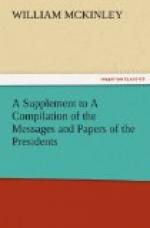With our revenues equal to our expenses, there would be no deficit requiring the issuance of bonds. But if the gold reserve falls below $100,000,000, how will it be replenished except by selling more bonds? Is there any other way practicable under existing law? The serious question then is, Shall we continue the policy that has been pursued in the past; that is, when the gold reserve reaches the point of danger, issue more bonds and supply the needed gold, or shall we provide other means to prevent these recurring drains upon the gold reserve? If no further legislation is had and the policy of selling bonds is to be continued, then Congress should give the Secretary of the Treasury authority to sell bonds at long or short periods, bearing a less rate of interest than is now authorized by law.
I earnestly recommend, as soon as the receipts of the Government are quite sufficient to pay all the expenses of the Government, that when any of the United States notes are presented for redemption in gold and are redeemed in gold, such notes shall be kept and set apart, and only paid out in exchange for gold. This is an obvious duty. If the holder of the United States note prefers the gold and gets it from the Government, he should not receive back from the Government a United States note without paying gold in exchange for it. The reason for this is made all the more apparent when the Government issues an interest-bearing debt to provide gold for the redemption of United States notes—a non-interest-bearing debt. Surely it should not pay them out again except on demand and for gold. If they are put out in any other way, they may return again to be followed by another bond issue to redeem them—another interest-bearing debt to redeem a non-interest-bearing debt.
In my view, it is of the utmost importance that the Government should be relieved from the burden of providing all the gold required for exchanges and export. This responsibility is alone borne by the Government, without any of the usual and necessary banking powers to help itself. The banks do not feel the strain of gold redemption. The whole strain rests upon the Government, and the size of the gold reserve in the Treasury has come to be, with or without reason, the signal of danger or of security. This ought to be stopped.
If we are to have an era of prosperity in the country, with sufficient receipts for the expenses of the Government, we may feel no immediate embarrassment from our present currency; but the danger still exists, and will be ever present, menacing us so long as the existing system continues. And, besides, it is in times of adequate revenues and business tranquillity that the Government should prepare for the worst. We cannot avoid, without serious consequences, the wise consideration and prompt solution of this question.




